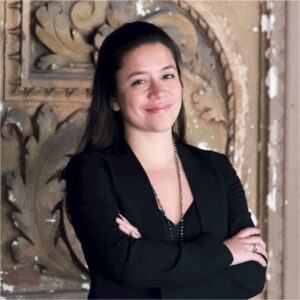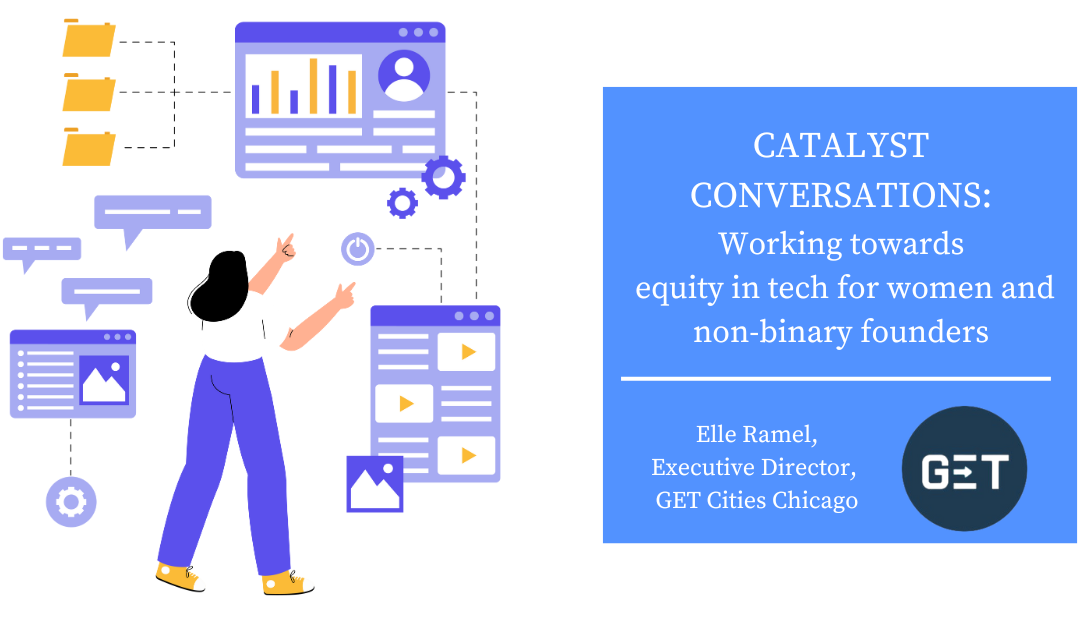CATALYST CONVERSATIONS: Working Towards Equity for Women and Non-Binary Founders
In the fall of 2020, Pivotal Ventures, Melinda Gates’s investment and incubation company, in partnership with Break Through Tech (formerly WiTNY, founded at Cornell Tech) and SecondMuse, launched a new initiative called Gender Equality in Tech (GET) Cities that aims to boost female representation and leadership in tech. Chicago was selected as the first location to launch the initiative, given its robust ecosystem of tech startups, higher education, investors, and Fortune 500 companies, making it particularly well-suited for this opportunity. GET Cities focuses on the tech sector because it creates the products and services (and jobs) of the future. And it just makes sense to develop more robust technology hubs in places other than Silicon Valley because not everyone can afford to live there.
Elle Ramel is the Executive Director in Chicago GET Cities initiative but is also a fierce leader and advocate in the larger Chicago economic development community. She has an extensive background in urban planning, obtaining a degree from Yale and an advanced degree from Cambridge, and has been a part of a number of initiatives in the Chicago area to create opportunities for underserved and underutilized regions, communities, and groups. GET Cities is currently operating in two other cities alongside Chicago; in Miami, and D.C. In Chicago, Elle and her team are working towards creating a template as to how to utilize local partnerships and organizing to promote the interests of women within the tech space.

Elle Ramel, Executive Director, GET Cities Chicago
Let’s start with the fundamentals of equity because at times it seems like many people still miss the bigger picture. Can you explain further about why there must be a shift from equality to equity?
I represent the office of a three-city, five-year initiative called “Gender Equality in Tech.” We’re really focused on women and non-binary empowerment in the tech ecosystem, education, technical workforce and entrepreneurship. I think the shift from equality to equity is a really important piece of the puzzle. First – some quick statistics. According to the national index, women and nonbinary make up about 26% of the tech workforce in this kind of economy with the intersectional lens of black and latinx women being about 7%. Small numbers, so we have a ways to go. I really like that focus on equity because I don’t even think it’s about the numbers. A lot of the work I do in Chicago is the lived experiences, meaning the quality of a job, the comfort and authenticity of how you can be at a job. I think that’s where equity comes in – is that work experience equitable and inclusive?
Where are the gaps that still exist in terms of funding for entrepreneurs in Chicago, particularly women, nonbinary people that are trying to start businesses there?
The current rule of thumb is when this program started in 2020, for every $100 a white, male founder raised in Chicago, a woman raised $2.60. So even doubling that number is a win, or working towards getting to $5 for every 100. Quite frankly, we’re a city of like a couple of unicorns and we’re really proud of that. But every time there’s a unicorn that raises $1,000,000,000, women and BIPOC founders are just trying to catch up. We do have a lot of women founders that come out of Chicago. That’s one thing that I’m passionate about working on at GET Cities is focusing on the experience of a woman/non-binary founders at the seed funding stage, which is raising between $250,000 and $4 million. There’s a lot of programs in the ecosystem to support starting a business, but when you’re in that tranche of institutional capital, capital from the coast, capital from the world, it gets a lot harder. What we’re trying to learn at GET cities is, do those women move away? Do they stay here? What are their struggles? We’re trying to learn more about what we can do to bridge that gap because there aren’t that many women-founded unicorns. I think that’s something that Chicago can really expand on is growing and supporting the women and nonbinary founded businesses that already exist.
“ I think that one is changing the hearts and minds of folks to understand that the South Side is a viable place to invest in.”
.What areas are you most excited seeing growth in for women and nonbinary founders? Which pathway would you say you’re most excited about or seeing the most growth?
At GET Cities, we stay true to two frameworks. One is the professional journey. Typically, we’re focusing on higher ed and the journey afte, and we have many allies like ISTC, that operate in more of the high school space. And then the entrepreneurial journey, which is from the inception of an idea to an IPO or to wherever that company may go. There are a lot of great programs in Chicago. We’ve been mapping all the different programs along those two journeys. I think a lot of the work that GET Cities is going to do is the conversion and then the tracking of people between different programs. For example, I would try to talk to philanthropists or corporations that support a robotics team at a high school. Chances are that young women, non-binary individuals, are exposed to and get excited about robotics as a result of that program. If they stay excited about it in ten years, they probably could be a great mechanical engineer or work in AI. What we’re seeing are disparate attempts at high school programming with the only the hope that those students go to college and then land an opportunity in a company in a STEM industry, But the knowledge of that journey is less known. If we’re going to be investing in all of these early programs, this is something our city could unify around and really have a knowledge and understanding of where these people with these emerging industry skills are going. And if they’re moving to another market, what do we need to do to connect with those young professionals and develop those opportunities in our city. But I think that the knowledge of where people are between those stepping stones is what I’m fascinated about.
Can you share how these equitable opportunities that are being offered to women benefit the larger tech ecosystem landscape?
One thing that I’ve based my approach on is the idea of employee-centered design and programing. I’ve decided to invest my understanding of like the lived experiences of the employees of these tech tech professionals. I want to create mentorship like those those kind of like citywide employee resource resources outside of a company to then also learn and give the, the actual the women nonbinary individuals a time to talk to each other and say, hey, I can get about this job. I work there. It’s it’s a great company. But as I get to learn that better, my hope is almost like a net. Migration is my learning of like, Oh, it’s interesting that everyone from Company A is that we can just see and like they tend to stay at sea and like, Oh, they’re getting promoted at sea. So that’s actually my approach right now is more just like watching the whole system because my KPI is more about systems wide tech retention and job growth. So I’m actually very agnostic to where you work as long as you’re flourishing. I might learn that everyone wants to be like, frankly, a tech consultant in like, how can I help you be? I don’t know if that’s that’s the true nature of it, but I ran a fellowship my first year for 20 tech professionals. We had we had a lot of job changes because it was a first job. I don’t know if you’ve been here for studying. Wait a minute, there’s another job. And so I’m I’m trying to use that learning to then understand what are some of the best practices I can glean and pick up. One of the biggest baseline that lets me know if someone is already ahead of others, is if they get on a call with me and their DEI officer can tell me the number of women and bipoc individuals with a company. My question is like, can you really make a change in the diversity, equity, inclusion space you’re not even sure of the demographic numbers per department or have that information readily available. Another thing I think we’re really working on for next year is mentorship training – intentional mentorship.

